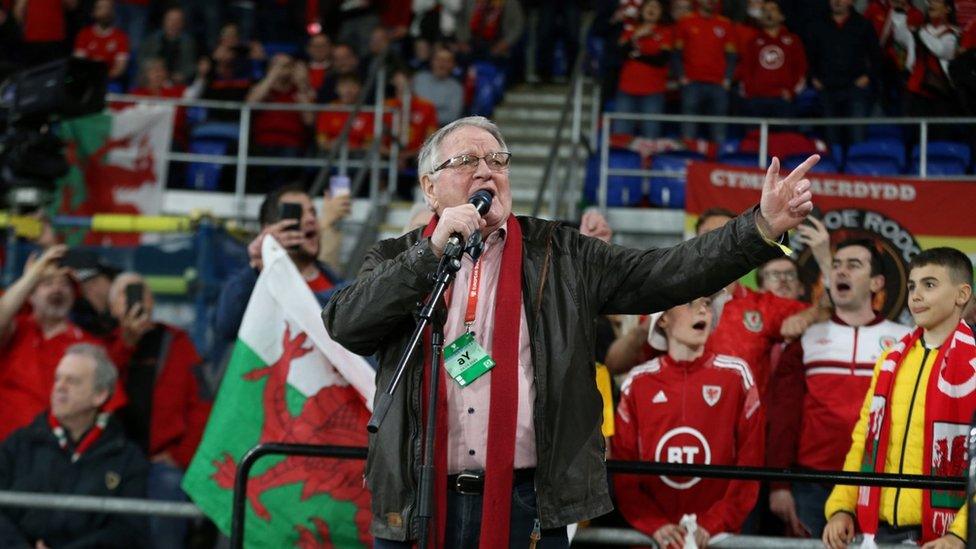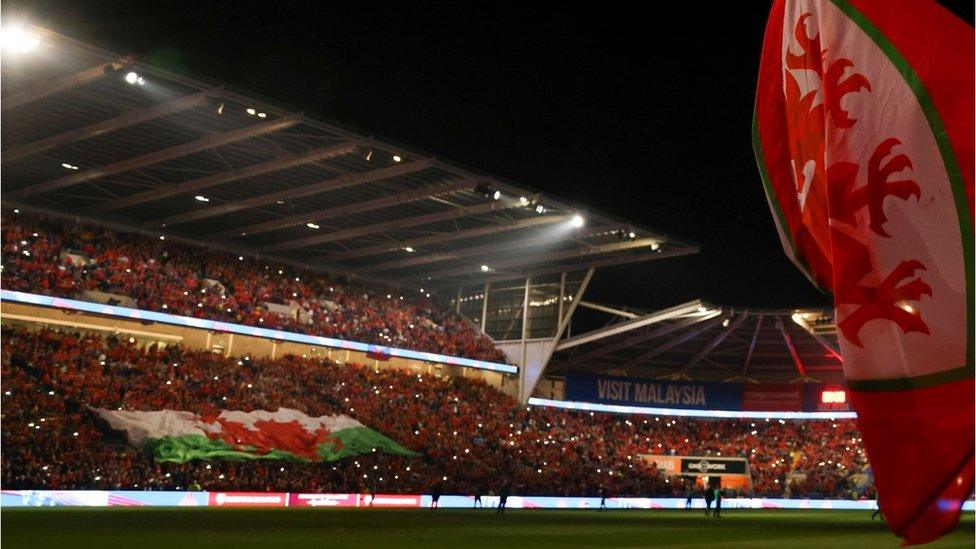Welsh football: Land of Song heard loudly from the stands
- Published

The crowd have played a huge role in getting Wales to the brink of the World Cup
While pundits praised one of the best displays ever by a Welsh football side, the players thanked the crowd for one of their greatest performances ever.
Gareth Bale called it "insane" while Aaron Ramsey described how the fans lifted the team.
They sang constantly throughout Thursday's 2-1 win versus Austria which puts the side just one match away from a first World Cup since 1958.
But what makes Y Wal Goch - or The Red Wall - such a force from the stands?
Commentator Ron Jones called it "one of the best performances" and achievements for the team, adding: "Everybody has been talking about the atmosphere, the crowd were simply wonderful.
"I contrast it sometimes with what is happening with our rugby at the moment, out of those or the majority of fans in the ground last night, next week they will be watching their club sides.
"They'll be watching Cardiff City, Swansea City, Wrexham, Welsh league teams, they are genuine football fans, they get behind the team, they're almost part of the team now."

Dafydd Iwan sang before kick-off on Thursday night
It is this coming together of fans from all corners of Wales, from Gwynedd and Anglesey in the north to Carmarthenshire in the west, Monmouthshire in the south and Flintshire in the north east, that has helped create a shared pan-Welsh identity.
For fan Tim Hartley, a whole subculture has grown between them and bound these fans from all over Wales together - as well as the singing, it is the fashion, the hats, the fanzines.
He has seen the side's fortunes on the pitch change over the years, as he has the performances from the stands.
The 61-year-old's first game was against Yugoslavia at Ninian Park, Cardiff, in 1976, a controversial draw that put Wales out of the European Championships.

Tim Hartley follows Wales around the world and has seen singing evolve
"It was pretty wild, a wild game and the atmosphere was electric. But it was a very different kind of feeling at the Grange End (of the stadium)," he said.
"Now there's proper singing, those were the days of football hooliganism, with chanting mainly."
From Cardiff City's anthem Men of Harlech to Swansea's Hymns and Arias, Euro 2016 song Don't Take Me Home and traditional Welsh language hymn Calon Lan, he sees the songs representing people from all parts of Wales.
He believes Welsh football is now doing what the great rugby sides of the 1970s did for Wales in binding the country together, and it is attracting men, women, children and people from all backgrounds.
Allow X content?
This article contains content provided by X. We ask for your permission before anything is loaded, as they may be using cookies and other technologies. You may want to read X’s cookie policy, external and privacy policy, external before accepting. To view this content choose ‘accept and continue’.

In particular he believes this was signified with Dafydd Iwan performing his anthem Yma o Hyd before kick-off.
"Dafydd Iwan is an icon in Wales and it was amazing him just being there," he said.
"It shows we are not conscious of singing in Welsh or in English, but we can do both, to cross over and embrace both.
"It's the normalisation of the Welsh language and it creates a great sense of nationhood."

Wales are aiming for their first World Cup finals in more than 60 years
Commenting on the singer becoming emotional after his performance, football writer Phil Stead agreed with this sentiment, external, tweeting: "Dafydd Iwan has been singing Yma o Hyd to Welsh language audiences for almost 40 years.
"Tonight he heard it sung back to him by 30,000 people from all parts of Wales. No wonder he cried."
Allow X content?
This article contains content provided by X. We ask for your permission before anything is loaded, as they may be using cookies and other technologies. You may want to read X’s cookie policy, external and privacy policy, external before accepting. To view this content choose ‘accept and continue’.

Legend Ian Rush is a man who suffered heartbreak in his quest to reach the World Cup during his 73-cap career.
During Thursday's match, the former Liverpool striker tweeted: "Ry'n ni yma o hyd. Er gwaetha pawb a phopeth."
The words to the song translate as: "We are still here. Despite everyone and everything."
Welsh football has suffered many ups and downs over the years, and while it is now riding the crest of a wave, there is an appreciation that this is being driven by the fans, the culture and their songs as much as it is by the great players on the pitch.

THE STORY OF MIWSIG: Eleri Price and Huw Stephens time travel with Welsh language pop
MARGINS TO MAINSTREAM: Michael Sheen introduces new writers revealing their truths

- Attribution
- Published25 March 2022

- Attribution
- Published24 March 2022
